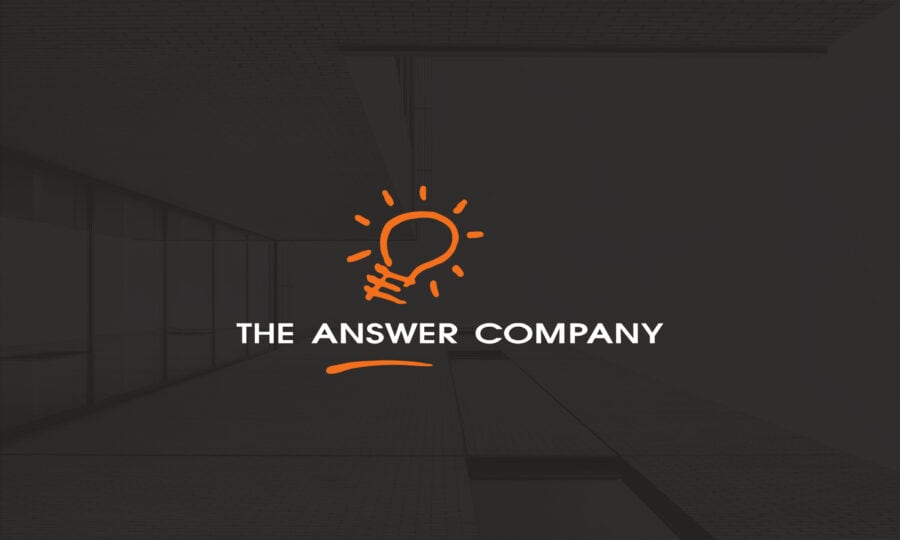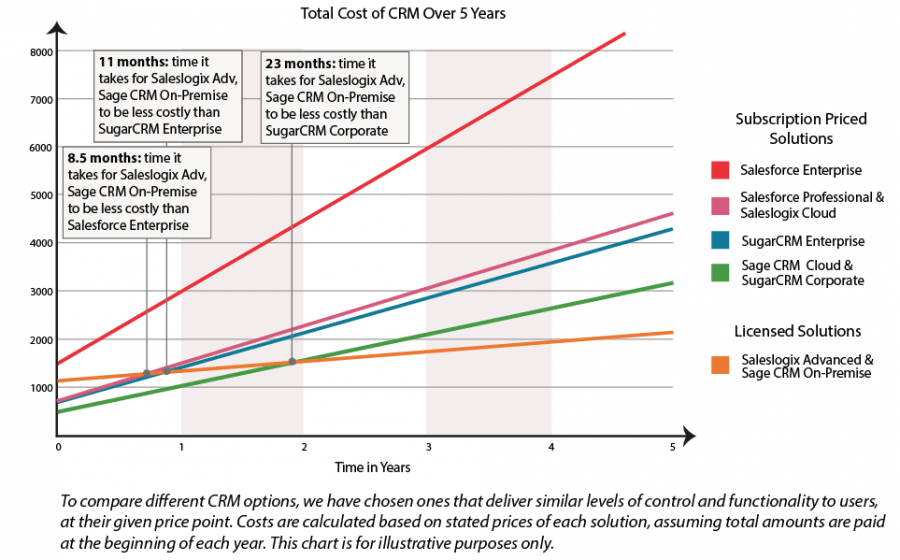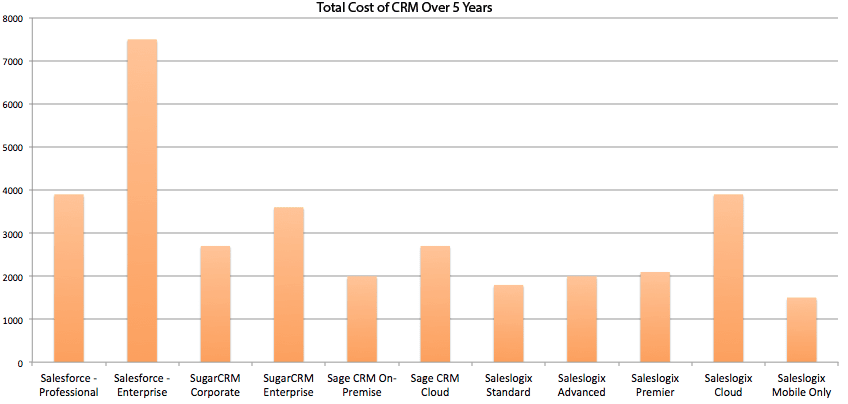The Real Cost Of CRM Systems: Salesforce, SugarCRM, Sage CRM, and InforCRM Comparison
UPDATED July, 20th, 2016
Customer Relationship Management (CRM) systems come in all shapes, deployment methods, and most importantly pricing arrangements. While some solutions seem affordable up front, total cost of ownership can quickly escalate as years pass, and with the cost of moving solutions being very high, it’s important to pick the right one from the start.
In this blog we have lined up four of the more popular solutions available for the Canadian small and medium businesses, and their associated costs. We want to shed some light into what determines the price of CRM solutions, with the hopes to help consumers pick a CRM that brings the most value to their investment.
Salesforce
Salesforce offers customers and prospects a variety of products depending on their needs, size and budget. Viewed as the first CRM widely available on the Cloud, Salesforce is available at $5/user/month (contact management only), but it’s not until you get to the Professional edition, at $75/user/month, that considerable CRM functionality (i.e. campaign management, email marketing, and customizable dashboards) is available. At this price point, Salesforce is available with set functionality, where prospects and customers adapt their data to fit the functionality of the system.
For $150/user/month, customers can purchase Salesforce Enterprise where customization is possible, along with additional features like workflow, sales territories, and access to buy additional apps and integration with other systems/applications outside Salesforce that a company may be using.
Salesforce pricing is straightforward for basic products, but it can get more complex when considering add-ons, especially for companies looking for specific functionality not included in initial packages. The same can be said for agreements that tie users to add functionality down the road. There are additional capabilities, restrictions, and costs associated with each product, including Salesforce Mobile, that have not been listed here. For a full listing of Salesforce price and functionality, see here. Lastly, for reasons unclear, CRMSearch.com reports that non-US customers seem to pay about a 45% premium.
Sage recently announced that they are partnering with Salesforce.
SugarCRM
SugarCRM is a popular Customer Relationship Management solution built for small and medium sized businesses, but also available for enterprises. SugarCRM products actually start free with basic sales, marketing, and service tools and no support. This is intended to introduce users to the products and direct them towards the Professional package available at $40/user/month, which includes deeper features in sales force, marketing, and support automation, as well as mobile functionality.
Prices go up to $65/user/month for the Enterprise edition, with increases in functionality and technical capabilities. The main difference with this advanced system is access to support, reporting and forecasting capabilities, offline client/customer portal, and managing opportunities and activities – not to mention storage space included with the subscription. For $150/user/month though, you will get an Assigned Technical Account Manager and additional storage.
Unlike Salesforce, SugarCRM is available both on-premise or via the cloud, with the same price for both. SugarCRM is unique in that it makes its source code available for those that want to build advanced customizations and integration with existing systems. Being open source software highlights the selling point of SugarCRM: the fact that it delivers the flexibility to adapt to the unique business requirements of individual companies, but it also brings about issues like depending on an outside community for development of functionality.
Sage CRM
Up until recently, Sage CRM was Sage’s only CRM solution. Whether a part of an ERP system or as a stand-alone solution, Sage CRM comes in two editions: Professional (Cloud) and On-Premise. The cloud version sells for $39/user/month if you pay for a year’s subscription up front or $45/user/month on a month-to-month basis.
The on-premise cost of the solution offers significant long-term savings to users. Companies can buy the system outright for a one-time fee of $995 plus server costs (average of $200 per user). After year one, an annual licensing fee of about $200 applies (21% of the solution’s retail value) via Sage Business Care for on-going support and upgrades.
The two options are rich in CRM functionality like sales (including forecasting, reporting, lead management), marketing (campaign, call and email management, segmentation and reporting) and customer service automation. Additionally, both versions have Sage’s characteristic advanced workflow design tools, multiple languages, and multiple currency capabilities. The difference in the two versions is that On-Premise allows for greater control over the solution, including advanced customization and integration, and component management (database customization).
Sage CRM is the only CRM in this list that was designed, developed and deployed to integrate with an ERP system. Due to its tight integration with ERP system and back-office accounting, it brings value to the organization that goes beyond the usual CRM related cost-benefit calculations.
This means that your relationship management tool integrates seamlessly with applications used by all departments of your organization, like accounting, purchasing, warehousing, production, and so on. In addition, because of Sage’s vast network of long-standing partners, implementing this solution is done with the help of skilled technicians.
InforCRM (formerly Saleslogix)
Saleslogix was purchased from Sage by Infor (along with ACT!, the contact management solution), and is now known as InforCRM. Positioned as Sage’s stand alone CRM solution, InforCRM became a well-known household CRM name, making it a desirable vehicle for Infor’s entry into the industry.
Similar to Sage CRM, InforCRM is deployed via a channel of partners which means that companies that choose this solution have highly skilled technicians guiding them through every step of the way. It is available on the cloud, on-premise, or via mobile only. InforCRM On-Premise comes in three variations, Standard, Advanced, and Premier, while InforCRM Cloud and Mobile only deploy the Advanced version of the solution.
All InforCRM versions, whether Standard, Advanced (on-premise, on the cloud, or via mobile), and Premier come equipped with all core CRM functionality, including sales, marketing, and customer service and support automation. While InforCRM Standard has limited security, administration, and customization controls InforCRM Advanced includes advanced security and administration, advanced processes, but customization’s cost extra. InforCRM Premier comes with advanced customization, integration tools, and enterprise servers included in the price.
InforCRM Cloud is available for $65/user/month, while the Mobile version is available for $25 a month. Recently, server costs for on-premise have been eliminated.
One time license costs for the Standard version are $795/user, while Advanced and Premier amount to $995 and $1095 respectively. An annual licensing fee of about $200 applies (21% of the solution’s retail value) per year after the first year. Since the acquisition of InforCRM (previously Saleslogix) by Infor, we have seen great things being done with the product, particularly with its mobile capabilities.
Summary
The biggest advantage for companies looking to invest in CRM solutions like Sage CRM or InforCRM is the option to buy the license outright, a one-time payment followed by renewal payments. Even with higher investments needed up-front, it takes less than two years before the subscription costs of solutions like Salesforce and SugarCRM surpass the total cost of ownership for licensed solutions like Sage CRM and InforCRM.
The best thing about these solutions is that they can be deployed in a private cloud, so on-premise prices apply to a Cloud solution, and it can be changed back to On-Premise at any time, depending on what would be the most advantageous for the business. It can also be changed to a full on public cloud solution, with substantial credits given for each licensed purchased by the business.


